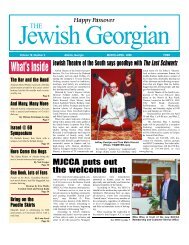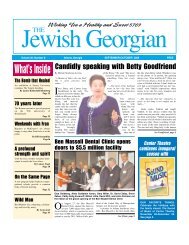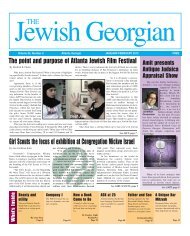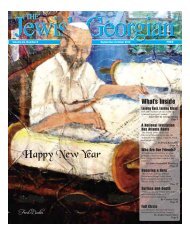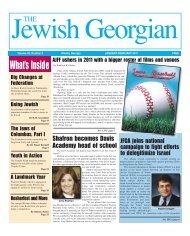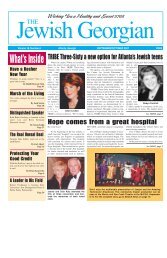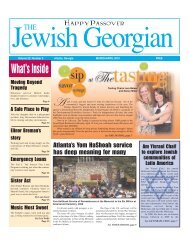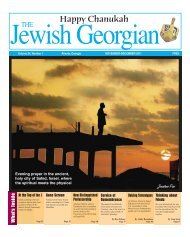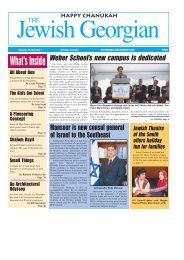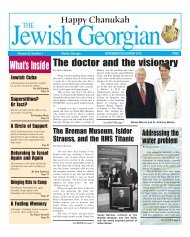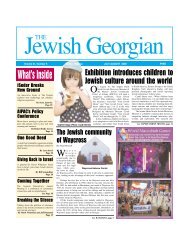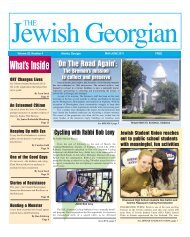FEDERATION NEWS - The Jewish Georgian
FEDERATION NEWS - The Jewish Georgian
FEDERATION NEWS - The Jewish Georgian
You also want an ePaper? Increase the reach of your titles
YUMPU automatically turns print PDFs into web optimized ePapers that Google loves.
July-August 2012 THE JEWISH GEORGIAN Page 23<br />
Shabbat<br />
From page 21<br />
furniture and floor coverings; dishes and<br />
glasses; beds and bedding; towels and bathroom<br />
fixtures. <strong>The</strong> building was ancient<br />
and needed work. My room was tiny and<br />
featured a jarring blend of school-dorm<br />
simplicity and jail-house practicality—two<br />
single beds (really cots) pushed together,<br />
harsh neon lighting, and cheap wooden cabinets<br />
nailed to the walls; a small and shaky<br />
desk, nightstand, and chair. <strong>The</strong>re were two<br />
additional smallish rooms, one for the toilet<br />
and another for a shower. Functional is<br />
about the best I can say about the place.<br />
<strong>The</strong>re was a bright spot. <strong>The</strong> main<br />
gathering area—sort of the hostel’s ballroom—was<br />
on the second floor. It was<br />
expansive and included colorful sofas,<br />
chairs, bean bags, and hammocks; a fully<br />
stocked bar and huge entertainment system;<br />
a dining area and public kitchen. It was here<br />
that everyone willing to pay out 35 shekels<br />
(about $9) came together for Shabbat dinner.<br />
Lacking the funds to wine and dine<br />
their guests, the hostel’s management came<br />
Massell<br />
From page 21<br />
I definitely got interested in real estate (and politics)<br />
because of him and made my living in<br />
commercial real estate before going full time<br />
into elected offices. He set the tone for my interests.<br />
I did get my LLB degree, but didn’t practice<br />
law.<br />
Where were you born, and where did you live<br />
growing up?<br />
I was born in Atlanta in the old Piedmont<br />
Hospital, then located downtown, about where<br />
the Atlanta-Fulton County Stadium was built. I<br />
lived my first month in the Massellton (an apartment<br />
building dad and his brothers built, which<br />
still stands on Ponce de Leon, as a condo building).<br />
We then moved to Druid Hills, where I<br />
lived for 11 years on Oakdale Road, followed by<br />
five years on Briarcliff. When I went off to college<br />
at the University of Georgia, the family<br />
moved into Midtown, on St. Charles Place.<br />
What was your first job?<br />
I have had four careers: 20 years in commercial<br />
real estate, 22 years in elected offices, 13 years<br />
in the tourism industry, and now I am in my 24th<br />
year of association management. Actually, my<br />
very first employment (other than newspaper<br />
routes and errand boy in my father’s law office)<br />
was two years as chief of publications for the<br />
National Association of Women’s and<br />
Children’s Apparel Salesmen.<br />
What caused you to get involved in Atlanta politics?<br />
My father instilled in me the value of giving<br />
back to my community, with one way being<br />
up with the novel idea of pulling<br />
everyone together like a family.<br />
<strong>The</strong> staff would go out and<br />
purchase the food for dinner,<br />
but it would be the<br />
guests who, with a little<br />
help from the<br />
staff, would do<br />
most of the<br />
prep work<br />
and cooking.<br />
So<br />
it was<br />
that a trickle<br />
of tourists<br />
from around the<br />
world began gathering<br />
in the kitchen area, as<br />
Jerusalem started shutting<br />
down for Shabbat. We stood<br />
around, gazing about, waiting for<br />
instructions. Fresh veggies were spread<br />
across several tables, and a few staffers<br />
handed out knives, bowls, and other such<br />
stuff.<br />
Before you could shout shalom, we<br />
were all slicing and dicing, sharing a bit<br />
about our background and chatting with<br />
Guests gather around the table for our Shabbat feast<br />
through civic life and the other in government.<br />
<strong>The</strong>re is very little difference in the two fields, in<br />
my opinion: In civic work, the people ask you to<br />
participate and don’t pay you; and in politics,<br />
you ask if the people will let you participate, and<br />
they pay you a small salary.<br />
Was mayor of Atlanta your first elected position?<br />
No, my first elected position was to the Atlanta<br />
Democratic Executive Committee, elected by<br />
wards to run the primary elections. This was followed<br />
by service on the Mountain Park City<br />
Council, a government body for the incorporated<br />
resort town between Roswell and Marietta<br />
(where only property owners were allowed to<br />
vote and hold office). I was then elected for two<br />
four-year terms as president of the Atlanta Board<br />
of Aldermen (now called the City Council) and<br />
vice mayor, after which, I was elected mayor of<br />
Atlanta (1970-1974).<br />
After your term of office as mayor, did you want<br />
to continue as an active participant in Atlanta<br />
politics?<br />
Because of my liberal leanings, I doubted that I<br />
could get elected in a regional or statewide contest.<br />
So I moved on to business interests that<br />
actually got me involved greatly in the political<br />
arena, which I still enjoy.<br />
How did you become involved in the Buckhead<br />
Coalition, and what are its goals?<br />
A group of guys started the coalition as a supplement<br />
to local government, feeling the mayor<br />
and council couldn’t do it all and that we shouldn’t<br />
take the success of Buckhead for granted. A<br />
headhunter firm was retained to find someone to<br />
run the program, and they came up with me.<br />
<strong>The</strong>y offered me a one-year contract, but I wanted<br />
a three-year agreement. We compromised on<br />
one another about our latest adventures.<br />
<strong>The</strong> ice had been broken. <strong>The</strong> people at<br />
my work station were typical of the<br />
guests at the hostel—a guy from<br />
Canada, traveling through<br />
Israel as part of his college<br />
coursework; a<br />
couple from Japan<br />
on holiday;<br />
and a midd<br />
l e -<br />
aged<br />
woman<br />
f r o m<br />
California<br />
visiting relatives.<br />
Well, you<br />
get the idea.<br />
<strong>The</strong> prep work<br />
took about 30 minutes;<br />
then we had another hour or<br />
so to talk and meet up with<br />
friends. Did I mention there was<br />
drinking? As the sky turned dark and the<br />
first stars of Shabbat winked and twinkled<br />
a two-year contract—which 24, years later, we<br />
still have not drawn! <strong>The</strong>re was work to be done,<br />
and I hit the ground running. <strong>The</strong> goal of the<br />
Buckhead Coalition is to nurture the quality of<br />
life of those who live, visit, work, and play in its<br />
28 square miles.<br />
As a longtime Atlanta resident, what do you consider<br />
Atlanta’s shining moment?<br />
Atlanta has earned headlines many times, and I<br />
have to think that its greatest success—not yet<br />
completed—is its reforms in race relations.<br />
Were you actively involved in that?<br />
I am fortunate to have come along in history at a<br />
time, and with the credentials, that allowed me<br />
the opportunity to participate in the city’s human<br />
relations reforms. <strong>The</strong> powers I had in public<br />
office to appoint the first woman to the city’s<br />
governing council and the powers to appoint the<br />
first black department head are but two examples<br />
that give me great pride.<br />
In what areas does Atlanta have to excel to compete<br />
with other cities in being a desirable place<br />
to live?<br />
I focus my attention as president of the<br />
Buckhead Coalition on this community, which<br />
must compete without grant funds or tax incentives.<br />
Thus, we must constantly strive to create<br />
and maintain an image and atmosphere that<br />
make this the address of choice for those within<br />
its boundaries. This, of course, includes a place<br />
that is safe, clean, and orderly.<br />
And, of those, what do you consider the most<br />
important?<br />
I think the magnet that attracts individuals and<br />
firms to relocate and remain in a community is<br />
always a combination—rather than a single<br />
across Jerusalem, we settled down for the<br />
evening meal. <strong>The</strong>re were about 50 of us<br />
spread about the room—friends and<br />
strangers, young and not-so-young, Jews<br />
and Christians.<br />
A youngish woman took a few minutes<br />
to detail the importance of Shabbat, offered<br />
some religious background and historical<br />
context, then lit the Sabbath candles.<br />
Another staffer said Kiddush, the traditional<br />
blessing thanking God for the “fruit of<br />
the vine,” and finished with a blessing over<br />
a loaf of challah.<br />
Our work and the work of the staff had<br />
pulled together a feast—fresh veggies and<br />
fruit; rice, pasta, and potatoes; chips, dips,<br />
bread, and chicken! I’ve already mentioned<br />
there was drinking, right?<br />
It was Shabbat, and we were family, at<br />
least for the moment, sharing a special meal<br />
in a very special city. As I said at the start,<br />
sometimes the best way to deal with a problem<br />
is to hold onto your money and use a<br />
little creativity. <strong>The</strong> evening worked for me,<br />
something I’ll be remembering in coming<br />
months. Now, I’m thinking the hostel’s<br />
bosses might want to capture some of their<br />
staff’s creativity and figure out how to use<br />
it to freshen up their property.<br />
choice—of values. And we must nurture everyone’s<br />
quality of life.<br />
Are any of your family members interested in<br />
civic or political activities?<br />
I have never pushed family members to get<br />
involved, because I think each person seeks a<br />
level of interest and makes a contribution in different<br />
ways.<br />
What do you think the future holds for the city of<br />
Atlanta?<br />
With Atlanta’s history of steady, sound growth, I<br />
don’t believe anything can hold it back, and it<br />
shall forever be out front.<br />
—————<br />
Recently, in the “Guest Column” feature of<br />
<strong>The</strong> Atlanta Journal Constitution, Sam Massell<br />
gave his views on the transportation situation in<br />
Atlanta. <strong>The</strong> following is a portion of that column:<br />
“...transportation...is a social concept for<br />
which the benefits cannot be measured with<br />
numbers. <strong>The</strong>y must be personally evaluated, by<br />
people.<br />
“<strong>The</strong> greater the growth and prosperity of a<br />
city, the greater the deprivation imposed upon<br />
those who are without satisfactory means of<br />
transportation. As a community expands geographically<br />
and culturally, the more absolute is<br />
the imprisonment of those who lack mobility.<br />
“Yes, I’m addressing the benefits of mass<br />
transit—safe, clean, and dependable rail and bus<br />
service; appropriate roadways with efficient turn<br />
lanes, synchronized traffic lights, and adequate<br />
signage; the benefits of connectivity—and the<br />
related transportation tax referendum scheduled<br />
for July.”



